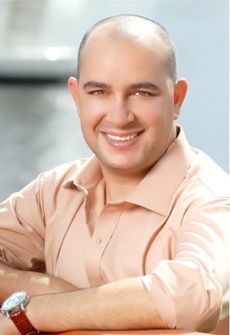|
Of
course, he was breaking the rules, but since both wishes
came true, perhaps it's not surprising that to this day Sarid delights in defying conventional wisdom and going his own
way.
"The
first wish was for good health and the second one was for financial
stability - with my limited vocabulary at the time, I called
it rich," Sahar recalled. It worked. Today, though
just 32 years old, he is healthy, wealthy and widely admired by
friends and business associates. Even Name Administration's Frank
Schilling, who many regard as the world's most
successful domain investor, is amazed by what he has seen from
Sarid. "Sahar is one of the most diligent, driven people I
have met in the domain business. He reminds me
of the kid who built a working
time-machine for his school science-fair project. His
concepts and dreams are so big I am almost certain he will
become a billionaire in the next decade."
This
business is rife with the kind of rags to riches stories that
define the American Dream. But even in this special milieu,
Sahar took a truly unique trail to reach the top. In early
childhood he started making critical decisions designed to open
the doors that had been closed to him. "At
the age of four I decided to make English my first
language," Sahar said. "Watching TV in Israel, where
most shows were played in English with subtitles, I realized the
world revolved around English. If I wanted to make it in this
world I knew English should be second nature, if not
first."
| Though
he was thirsty for knowledge Sahar wasn't exactly a model
student. "School was a unique experience. My older
sister was known as a "problem child" and when
I joined school I |
| was
expected
to be one as well. Because of her reputation, my first
year in school was mostly spent helping the principal do
tasks, carry papers and such, rather than being in
class," Sahar said. "My mom was not very
concerned with school grades. Her philosophy was to be a
good, kind human being, find what you like to do, and do
well at the things you like to do."
Trying
to raise Sahar and his two sisters alone left Aliza
Sarid with little time to attend school meetings.
"My older sister was attending instead, dealing with
teachers as they |
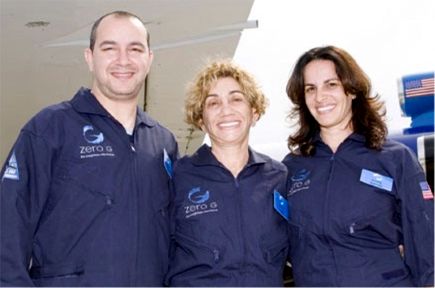
Who
says what goes up must come down?
Sahar Sarid, his mother (center) and sister recently
defied gravity on a "weightless flight" at Zero
G |
| complained
about my grades," Sahar said. It wasn't that he wasn't smart
enough to do the work. The problem was he insisted on
doing things his way. |
"Around
the 4th or 5th grade, I noticed that teachers were teaching from
different books than the ones we were learning from," Sahar
said. "I started to buy the books the teacher was teaching
from, giving me an advantage over the whole class, and at times,
the teacher. I did that for fun, not for grades. When it was time
for exams I would not care, leave, or refuse on the grounds I have
nothing to prove to anyone but myself. How I passed any classes is
still a miracle none of us have figured out!"
Thinking
"outside the box" frequently got Sahar into hot water
during his school days. On his blog, The
Conceptualist, he recently wrote about another
incident that perfectly illustrates this point. When he was in 7th grade a carpentry
teacher told her class that their year end project would be to
make anything they wanted out of wood - and the quality of what
they turned in would play a major role in their final grade.
"I had
zero interest in carpentry, wood, or anything
related!," Sahar said. "So I drew up plans for a big beautiful desk
that I could use in my room, then I took some money I had saved and went to a
professional carpenter to have it made!" Sahar got
back a desk that was so big and heavy he had to get help bringing
it to school when it was time to turn in "his" project.
|
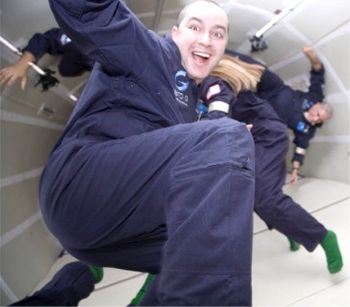
When
Sahar heard about the rule of gravity
he had to break that one too!
|
The
teacher took one look at the desk and it was so obvious
Sahar had not made it that she burst out laughing, finally
exclaiming "What is THAT!?" Sahar replied that
since he had no interest in carpentry he decided it would
be best to have a professional do the work for him!" To my mom's credit here, she supported the move
fully," Sahar said with a smile. "Thinking of it today, that failing grade in school
was really a winning grade in life. The ability to find and contract work to others will get you much more then if you were to do everything on your own."
Sahar's
academic career came to an abrupt end his senior year but
this time it wasn't because of something he said - it was
something he wouldn't say. "Another schoolmate
threw a paper airplane at the teacher |
| during
class. The principal called me over and asked if I knew
who did that and I said yes. She asked who it was and I
said I can't tell, it's against my values. She gave me an
ultimatum to either tell or leave and I chose the
latter," Sahar said. |
As
someone who had been bucking authority figures his entire life,
what Sahar did next was about as far from the "perfect
fit" as anyone could get. At 18, he joined the Israeli
Army. When his tour of duty was up, his commanders undoubtedly
breathed a sigh of relief. "I wasn't the perfect soldier (to
say the least) and when I left, one of my commanders told me that
with my attitude I would never make it outside. But during
my 30 days vacation before leaving the army I got a job as
business manager of a rollerblade shop that paid more then this
commander was making after spending years in the army. I had
started rollerblading at 12 and just enjoyed it. By 18 I was a
professional," Sahar said.
|
While
Sahar was away doing his stint in the service, his mother
had a chance meeting with an American tourist that
would eventually change the family's fortunes for good. On
a sunny day, Aliza had taken their German Shepherd Muki
for a walk on a stretch of beach near their home. She came
upon a woman from the U.S. who was tired and over-heated
from being in the sun too long. Aliza stopped to ask if
she was all right and gave her some water. The two women
chatted and Aliza mentioned how difficult life had been
for her family in Israel. The women told her that if she
ever wanted to come to New York she could stay
with her.
The
two women stayed in touch and a year later Aliza left for
America with nothing but $100 and a suitcase. One of Sahar's sisters
also decided to go to the U.S. but she headed for Houston
after seeing an ad in an Israeli newspaper touting an ice
cream truck business opportunity. Six months later, Sahar
followed and helped his sister on the truck. They decided
they could grow the business by getting a second truck so
that she could concentrate on the commercial areas (where
the male workers were attracted by a pretty woman) while
Sahar served the neighborhood kids he enjoyed being around
so much. |

Muki
The Sarid
family's beloved
German Shepherd (now deceased) |
Sahar
also worked a variety of odd jobs in those early years but as 1999 was coming to a
close, he was still sharing that mobile home with his sister. When
she went back to Israel for a short visit, Sahar's mom came down
to Texas for a couple of weeks to keep her son company. He had
just read an article about the domain name Business.com
selling for $7.5 million and told Aliza about it. Her eyes
lit up as she asked Sahar why he didn't get involved in that
business!
| He
gave her what he thought were three good reasons; one - it is
expensive (the guy who sold business.com had paid $150,000 to
get it), two - it requires expert knowledge and three - it is too
late (he believed all of the top domains had |
| already been scooped
up). Aliza had an answer to each of Sahar's objections. Even
though they had no money his sister had a credit card with a $20,000
limit! Aliza was also willing to work with him day and night to do
research, study dictionaries and anything else it might take to
find their way in this business. As for it being too late, Aliza
simply said, "I just don't believe that!"
So,
armed with a credit card but no idea how he would would pay back
what he charged, Sahar went to work. "For
the next 30 days I spent days and nights online learning the ropes
of the domain game, identifying key players, making friends,
asking questions and spending the $20,000 to buy
whatever I could as fast as I could," Sahar said. By the end
of that first month he had run through all of his credit,
so he went to a chat room dedicated to the domain industry at GreatDomains.com
and asked if anyone would lend him $3,000! |

Sahar
at T.R.A.F.F.I.C. East 2006
in Hollywood, Florida |
"The
concept was someone invests in me and we partner on the $3,000 in
domains I purchase," Sahar said. "Well, a fellow I had
never talked with before sent me an instant message asking, "Where
do I send the money!?" The next morning Sahar found the
funds had been wired into his bank account. "That night the
guy came back online, we chatted and I found out he had the same
amount of names I did and that he was a programmer, which I needed
in order to figure out the expired domain system. So we decided to
partner on both of our portfolios - and without him who knows
where I would be now!"
|

Jeff
Bhavnanie
He sent Sahar $3,000 (no questions asked)
and remains his partner today. |
Sahar's
unexpected benefactor was Jeff Bhavnanie and though
sending $3,000 to a stranger might seem like a wreckless
thing to do, Bhavnanie said it was one of the best moves
he ever made. The men are still partners today and they
have helped each other rise to the very top of this
profession.
Bhavnanie
said, "There was only one guy in that
chat room that was always trying to make a deal and was always asking questions about
how the drop game worked. Of course, the guys that knew wouldn't
tell and after each drop they would come and brag about who picked
up what. So we started chatting and I liked his enthusiasm about
learning new things and becoming very good at it. Since i was more a
technical person and he was more of a people person it made sense for both
of us to team up as we needed each other to go to the next step."
"He said
send me $3,000 then together we'll purchase names that will belong to both
of us. |
| To me, it was either I spend the 3k buying names myself or get a
partner and pool two thought processes and get names, so I decided
maximum, if I lose it, will be 3K but what I might gain will be
immeasurable." |
"My dad always put the philosophy of "No risk no gain" in
my head, so I went with it," Bhavnanie said. "We figured out the drop cycle
very soon and put the 3k to good use. All this without meeting face to face. Once we started to make
a few bucks
I decided to go meet him in Texas. It was four months after we created
the partnership and I got to meet his wonderful family. They are
warm, loving, great people." Bhavnanie added, "There are
a couple of things that stick out about Sahar. His thought process is always
unconventional, which leads to his good ideas and he'll go out of
his way to help you."
|

Sahar
with 2-month-old Lala |
In January 2000
Dwayne Rowland (from Exody.com)
visited the GreatDomains chatroom and told people he had figured out how the expired domain system worked, and was willing to share
what he learned. Sahar said, "Now realize this was a closely-guarded secret and no one would talk about it. I immediately messaged Dwayne and
I was all ears. We took the conversation to IRC and for the next couple of hours he laid out the whole system, with one
missing bit of data - the exact timing for when the names dropped. Jeff set up a script the next day to hit the registry for 24 hours continuously and found the exact time
by the next day."
"Within a couple of weeks we became a driving force, picking up some of the best dropped names, competing (and winning) against
most," Sahar said. "In February 2000 we caught a two-character name that I cannot disclose due to a confidentiality agreement.
A few days later we got our first offer on the name for
$2,000, which we declined immediately. We negotiated the price up to
$80,000 and before signing a contract, another party got involved. They wanted it
very badly and |
| asked us what it would take to sell it to them. Our answer was
$200,000 and they went for it. We got the money and invested everything back in the business, not taking a dollar home. At the same time we made another major decision, which was not to
base our business on selling names. We did not want to sell any name as we liked all of
them. As Frank Schilling says, "They are like our
children." |
|
Sahar
started brokering domains and researching other ways to
make money from names so he wouldn't have to let any of
his prize possessions go. In 2000, he met Rick Schwartz
and they soon became friends. A couple of years later
Sahar was among a small group that Schwartz invited to his
Boca Raton, Florida home for a mini domain summit.
Very mini - Sahar said only five guys were there, but
that's where the seeds were planted for today's T.R.A.F.F.I.C.
conferences (founded by Schwartz and Howard Neu).
Sahar
liked Florida so much that less than a month after the
meeting at Schwartz's house, he and his mother moved to
the Sunshine State, settling just a few miles from where
Schwartz lived.
Sahar
also wound up brokering the sale of Candy.com to
Schwartz for just $108,000. "I think he would
like a do over on that one!" Schwartz said.
"But Sahar is one of the single sharpest guys in the
space. He is a good friend and he is just one of the really good guys out there. He has many great accomplishments and he has positioned himself to be a billionaire in his lifetime."
|

Rick
Schwartz
Sahar helped him land Candy.com
|
|
The
value of Sahar's holdings took a huge jump with the start
of the new millennium as new domain monetization options
were unveiled. "We found out about the PPC business with a small company called
7search and were with them for about one
year," Sahar said. "Then one day we got an email for a domain we owned from
Dean Shannon of Fabulous.com. Dean wanted to buy the domain and while chatting, we told him we owned these other high traffic domains. We worked
out a deal over email to test all our names for one week for a flat fee and right after that, Dean gave us a
deal of a lifetime, a flat fee for a year."
|
"The next major development
involved a domain we bought for $12 in mid-2000 on the drop, a name that had no meaning at the time.
However, it started to generate traffic and revenues very quickly because it became a word/phrase that was seen, discussed or talked about nearly
everywhere (we know the name, which is now a common computer
related term, but Sarid did not want to publicize it). In 2003 we signed a contract to lease the domain for 30 days for
$3,000 with option to sell for $60,000 at the end of
the lease. At the end of lease, the lessee said his maximum offer was
$30,000. We declined. Two years later this domain was generating
$3,000 a day on PPC."
Sahar
credits Richard Lau for helping him make the next big leap
forward. We were big fans of Fabulous.com and it was very hard to get me to
even try someone else," Sahar said. "I truly love the people at Fabulous, but Richard talked us into trying
HitFarm.com with a few domains and the revenue difference was substantial. We moved our entire portfolio within a month.
| In
January of 2006, Sahar made another move. "Over lunch
at the T.R.A.F.F.I.C.
Silicon Valley conference we did a deal with DomainSponsor.com,
putting together a flat fee agreement in the seven-figure
range for a short period of time to test their parking program. Hitfarm wanted us back
(and we wanted them back as well, we love HitFarm) and within a couple of months they gave us a
multi- year contract with better payments and terms.
My take on it, as I explained to both DomainSponsor and HitFarm, is that long-term deals are better for
everyone," Sahar said. " It gives them the ability to invest time and energy into optimizing without worrying a client would leave tomorrow for a small increase in
rev share. On those deals, with both DomainSponsor and
HitFarm, we got a premium on top of our rev share. I recommend those with large premium portfolios to try this approach." |
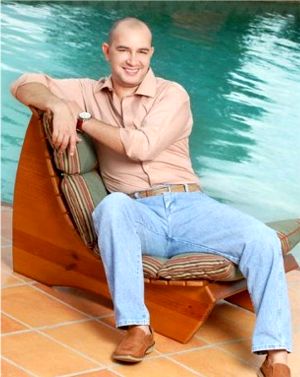
|
HitFarm
co-founder Kevin Ham said, "Sahar's ideas and thoughts are many years ahead of most people and I
know that whatever he does, he will do with passion and will be very
successful. I am thankful to have friends such as him around me. When
he left our service for a competing service, he took me aside and told
me his thought process and why he was leaving us for a few months. He
then sent me something that I will never forget. He knew I was a very avid
Bible reader so he sent me a little book that fit into a small metal
keychain case. I later discovered that this was the book of Psalms
from the Old Testament. He is no doubt our most valued business associate. At a time where Wall Street people are looking
to come in, do some consolidation and then flip the business to a
bigger media company, we need more entrepreneurial spirits like Sahar in the space, who think beyond just numbers and
profits, and drive passionately towards building a legacy."
Aside
from a few of his very close friends, I'm sure many readers are
thinking "how come I haven't even heard of this guy who has
been such a major player for the past seven years?" Over that
span of time Sahar Sarid has been one of the most private
people in the domain industry. Though I first met him at the first
T.R.A.F.F.I.C. conference in Delray Beach, Florida in
October 2004, I (and most others) didn't learn his real name until
this year.

Sahar
at home with Lala and Dixie |
Until
"going public" in 2007, he went by the name
"Sal" and used the handle "Shepherd"
in domain forums (a tribute to the German Shepherd dogs
he is so attached to). I asked him about why he had played
things so close to the vest before doing an about face
this year with the founding of his new company, Recall
Media Group, and the inauguration of his blog
at Conceptualist.com.
"Early
on we had our fair share of mistakes. We were new to the
business and trademark laws weren't as clear as today
(they are still far from perfect.) Being private allowed
me to concentrate on my core business without distraction.
The domain business does not require you to be public,
everything can be operated from your bedroom, by email (if
you decide to answer any)," Sahar said.
"I
started in this business when I was 25 years old. By 27 I
could have retired. Of course I did not want to retire,
but the possibility to do it if I chose gave me the
opportunity to think of other things besides business and
finances. It gave me the |
| freedom
not to worry about the day-to-day things as they were now
taken care of. My goal is to make the world a better place
by improving questioning skills of current and future
generations, thereby creating better educated young people
which I hope will make the world a better place tomorrow.
In order to accomplish what I want to do here it requires
a different approach, a more public approach." |
"As
for blogging, it is a lot of fun. Trying to come up with new
thought-provoking information on a daily basis is challenging!
Currently I put the blog on hold until I get few things together.
I plan to bring it back to life by mid-May," Sahar said.
While
PPC revenues have given Sahar the freedom not to work, he is
actually working more now than ever because he has decided his
future lies in developing full-blown businesses on his better
domain properties, with FuneralHomes.com
being a prime example. "Sitting back allows the world to
catch up or even pass you by and as domainers I don't think it
fits our nature," Sahar said. "Jeff and I make a great
team. I get ideas and he knows how to build them, but the missing
part all these years was someone to execute our ideas
into actual business models.
|
Two
and a half years ago at the first T.R.A.F.F.I.C. show we
met Darren Cleveland (now Recall Media Group's
President and CEO). Darren is a local Florida resident and
entrepreneur. We hit it off with Darren very quickly and
found someone young, ambitious, reliable and kind. We
spoke for another year about getting together on
something, and one day just took a leap of faith and it
is working great!"
"We
have a great foundation and are building a great team. We
are consistently adding talented people and have a
first-class programming team. We formed RMG with the idea
that we have digital assets that are not being used to
their full potential with the current parking pages
(although they serve their purpose). We develop scalable
platforms and convert them into successful self-sustained
businesses. FuneralHomes.com is a great example,
where we intend on scaling the model into other
verticals," Sahar said.
His
team had also been working on a massive project for the
past two years that could be his |

Darren
Cleveland
President/CEO, Recall Media Gorup |
| most
successful endeavor yet. To keep potential competitors at
bay, Sahar does not want to talk publicly about it yet,
but the people around him know what he has been up
to and the potential the project has to change the entire
game. We normally would not even mention something that we
can't fully illuminate for you, but I think this is worth
noting because it illustrates Sahar's strong desire to
accomplish something so big it will change society at
large. |
This
is an industry where the landscape changes on an almost daily
basis. With Sahar's knack for staying a step ahead of the pack, we
were interested in hearing his view of the future for domains.
"I'm very bullish on domains and Internet search in
general," Sahar said. "Generic domains are essentially
web keywords, without spaces, and an additional extension (most of
the time .com). I believe personalization
search will change everything for web search and
domains."
"To
give you an example, "Real Estate" is a volume term, but do we know enough about the need of the person who types it? It would be a better search term if it was more specific, such as "New York Real Estate" and even better if it was "New York Commercial Real Estate".
When a user types "Real Estate" isnít he looking for more specific results? Of course he is, he just doesnít express himself as well as we wish he would. We know that by understanding how satisfied (or trained) searchers are with current results."
|

Sahar
speaking at the T.R.A.F.F.I.C. West conference in
Las Vegas - March 2007 |
"I see a future where we can understand what a user means when he types "real estate". We will be able to break the generics into specifics with no effort, in real time.
By doing that we will shift the volume of generic terms into the POWER of specific terms,
essentially making almost every search a TARGETED SEARCH. The reason
a lot of generic search terms command high PPC bid prices today is because
of search volume/advertiser pressure. When that same search volume/pressure
shifts to specific terms, I expect traffic value to shoot through the
roof. It wonít be any surprise to me to see single domains make
100X todayís revenues on a simple PPC type page with type-in traffic alone.
The question for me is not if, but when?," Sahar said.
Any
time someone with high hopes and dreams reads a life story
like his, they think "I can do that too".
But with the domain business so different today from when
he started, is it really possible for under funded new
arrivals (like he once was) to make their wishes come true
in this industry? |
|
"My
take on it is if you have the skills to bring value
to a business you control your own future. I built such a system, which proved to be successful, with those who are committed to it. The issue isn't money, never has been. The issues are learning stages, persistence and commitment. What do I mean by that? If I want to learn a new skill I don't start at the top, I start at the bottom. If you were to start in the domain business today with millions of dollars what most likely will happen is you will make major mistakes on large sums of
money," Sahar said. |
"So here are two examples, where you can avoid huge losses and learn from the bottom
up. First, brokering domains which allows you to gain experience on other people's money and knowledge.
Every investor is looking for great deals but a major problem all investors have is
lack of time. Here's how it works:
-
Identify an investor you wish to work with.
-
Approach the
investor and ask him what kind of deals he is looking for. This is essential because investors have their own set of priorities. Do not try to sell them what they are not interested in.
-
Once the investor tells you what he is looking for you ask him "when." If
I find those kind of deals for you, can I get X% commission on the deal?" No decent investor will turn you away here. Work
out a commission structure that works for both of you.
-
Learn how to find those deals for your investors. The great thing about this is your investor is already an expert and every deal you run by him, whether he accepts it or not, is a learning experience to understanding the business. If an investor declines a deal
always ask "why?"
-
Continue to do so until you have enough money to select deals to pick and
choose from. At this point if a deal is really sweet, you take it yourself and if it's too expensive or not for you, you move it to your investor. This is where you build your own momentum.
|

|
A
side note: It's important to have more then one investor in your corner. That way if a deal doesn't meet one investor's
needs you can approach another.
I have had success with this strategy and the cost to me was absolutely nothing,"
Sahar said.
"Next, learn with time, methodically:
-
Commit a small amount of money to start, say a few hundred dollars or few thousand dollars. Whatever the amount is, divide by 180 days (six months).
For example: If $6,000 is your budget commitment then it equals
$1,000 per month (for six months), or $33 per day.
-
Commit to spend your daily budget EVERY SINGLE DAY for six months buying domains.
This helps because you will get tired of making mistakes and you will gain experience the hard way, by losing.
|
-
When you buy domains, whether you are flipping or
monetizing, monitor your success and your failure and learn from it.
-
Once you get to a point that you make
$1 profit, you've figured out a system. Do the same thing a million times and you have a million dollars.
|
This system worked well
for me with Google Adwords but it can work for domains or anything else you wish to learn in life. Just as you would not start climbing mountains with the highest mountain in the world you should not do the same with business. Start with small mountains, small challenges, figure them out, and advance.
Rome wasn't built in a day, and Yun Ye's portfolio was not
either." (Editor's Note: Yun Ye is the man who sold his
domain portfolio to Marchex for $164 million).
|
There
is an old adage that says money can't buy happiness. If
anyone would know whether or not that is true, it would be
Sahar who has seen both sides of the coin over the past
decade. Before we said goodbye, I asked him how he would
sum up himself and what he lives for, in a single
paragraph.
"I love animals, especially my German
Shepherds. I also enjoy skiing, kayaking, coffee shops, reading (articles, business, and motivational books). I am highly focused at everything I do to a point of near
obsession," Sahar said. " I am dedicated to making the world a better place through the enhancement of questioning skills and hope other domainers who have had success take a look at
giving back to society. As for happiness - I don't understand happiness too
well and am still trying to find where it fits in my life. I'm more focused
on helping
others than worrying about my own happiness. In essence, that may be
my happiness." |
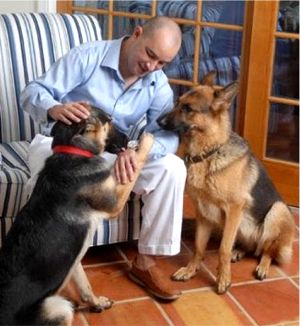
|
*****
|











